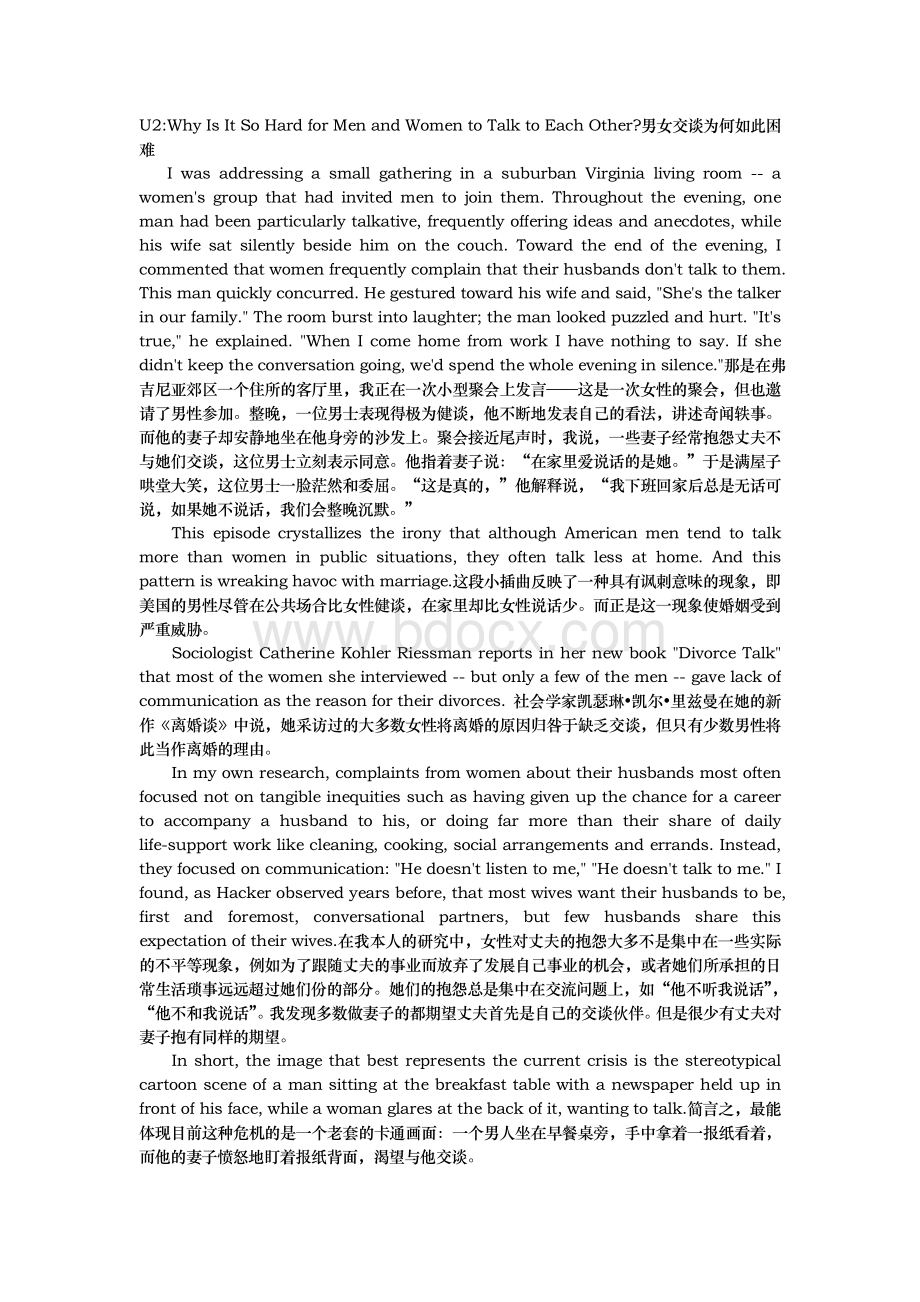课文全文翻译参考译文u2.doc
《课文全文翻译参考译文u2.doc》由会员分享,可在线阅读,更多相关《课文全文翻译参考译文u2.doc(5页珍藏版)》请在冰豆网上搜索。

U2:
WhyIsItSoHardforMenandWomentoTalktoEachOther?
男女交谈为何如此困难
IwasaddressingasmallgatheringinasuburbanVirginialivingroom--awomen'sgroupthathadinvitedmentojointhem.Throughouttheevening,onemanhadbeenparticularlytalkative,frequentlyofferingideasandanecdotes,whilehiswifesatsilentlybesidehimonthecouch.Towardtheendoftheevening,Icommentedthatwomenfrequentlycomplainthattheirhusbandsdon'ttalktothem.Thismanquicklyconcurred.Hegesturedtowardhiswifeandsaid,"She'sthetalkerinourfamily."Theroomburstintolaughter;themanlookedpuzzledandhurt."It'strue,"heexplained."WhenIcomehomefromworkIhavenothingtosay.Ifshedidn'tkeeptheconversationgoing,we'dspendthewholeeveninginsilence."那是在弗吉尼亚郊区一个住所的客厅里,我正在一次小型聚会上发言——这是一次女性的聚会,但也邀请了男性参加。
整晚,一位男士表现得极为健谈,他不断地发表自己的看法,讲述奇闻轶事。
而他的妻子却安静地坐在他身旁的沙发上。
聚会接近尾声时,我说,一些妻子经常抱怨丈夫不与她们交谈,这位男士立刻表示同意。
他指着妻子说:
“在家里爱说话的是她。
”于是满屋子哄堂大笑,这位男士一脸茫然和委屈。
“这是真的,”他解释说,“我下班回家后总是无话可说,如果她不说话,我们会整晚沉默。
”
ThisepisodecrystallizestheironythatalthoughAmericanmentendtotalkmorethanwomeninpublicsituations,theyoftentalklessathome.Andthispatterniswreakinghavocwithmarriage.这段小插曲反映了一种具有讽刺意味的现象,即美国的男性尽管在公共场合比女性健谈,在家里却比女性说话少。
而正是这一现象使婚姻受到严重威胁。
SociologistCatherineKohlerRiessmanreportsinhernewbook"DivorceTalk"thatmostofthewomensheinterviewed--butonlyafewofthemen--gavelackofcommunicationasthereasonfortheirdivorces.社会学家凯瑟琳•凯尔•里兹曼在她的新作《离婚谈》中说,她采访过的大多数女性将离婚的原因归咎于缺乏交谈,但只有少数男性将此当作离婚的理由。
Inmyownresearch,complaintsfromwomenabouttheirhusbandsmostoftenfocusednotontangibleinequitiessuchashavinggivenupthechanceforacareertoaccompanyahusbandtohis,ordoingfarmorethantheirshareofdailylife-supportworklikecleaning,cooking,socialarrangementsanderrands.Instead,theyfocusedoncommunication:
"Hedoesn'tlistentome,""Hedoesn'ttalktome."Ifound,asHackerobservedyearsbefore,thatmostwiveswanttheirhusbandstobe,firstandforemost,conversationalpartners,butfewhusbandssharethisexpectationoftheirwives.在我本人的研究中,女性对丈夫的抱怨大多不是集中在一些实际的不平等现象,例如为了跟随丈夫的事业而放弃了发展自己事业的机会,或者她们所承担的日常生活琐事远远超过她们份的部分。
她们的抱怨总是集中在交流问题上,如“他不听我说话”,“他不和我说话”。
我发现多数做妻子的都期望丈夫首先是自己的交谈伙伴。
但是很少有丈夫对妻子抱有同样的期望。
Inshort,theimagethatbestrepresentsthecurrentcrisisisthestereotypicalcartoonsceneofamansittingatthebreakfasttablewithanewspaperheldupinfrontofhisface,whileawomanglaresatthebackofit,wantingtotalk.简言之,最能体现目前这种危机的是一个老套的卡通画面:
一个男人坐在早餐桌旁,手中拿着一报纸看着,而他的妻子愤怒地盯着报纸背面,渴望与他交谈。
LinguisticBattleBetweenMenandWomen两性间的唇枪舌剑
Howcanwomenandmenhavesuchdifferentimpressionsofcommunicationinmarriage?
Whyisthereawidespreadimbalanceintheirinterestsandexpectations?
在婚姻中的交流问题上,为何男女会持有如此不同的观点?
为什么男女的兴趣和期望普遍不一致?
IntheApril1990issueofAmericanPsychologist,StanfordUniversity'sEleanorMaccobyreportstheresultsofherownandother'sresearchshowingthatchildren'sdevelopmentismostinfluencedbysocialstuctureofpeerinteractions.Boysandgirlstendtoplaywithchildrenoftheirowngender,andtheirsex-separategroupshavedifferentorganizationalstructuresandinteractivenorms.斯坦福大学的埃莉诺•麦科比在1990年4月《美国心理学家》刊物上发表了她自己和他人研究的结果。
研究结果表明,儿童的发展主要受同龄伙伴交往过程中社交结构的影响。
无论男孩女孩都喜欢与同性伙伴玩耍。
不同性别的儿童小群体有不同的组织结构和交际准则。
Ibelievethesesystematicdifferencesinchildhoodsocializationmaketalkbetweenwomenandmenlikecross-culturecommunication.Myresearchonmen'sandwomen'sconversationsuncoveredpatternssimilartothosedescribedforchildren'sgroup.我相信,儿童时代社交过程中的不同规则,导致了两性间的交谈如同跨文化交流一样难。
我本人通过对男女对话的研究发现,成年男女对话的模式类似于儿童群体交流过程中的模式。
Forwomen,asforgirls,intimacyisthefabricofrelationships,andtalkisthethreadfromwhichitiswoven.littlegirlscreatandmaintainfriendshipbyexchangingsecrets;similarly,womenregardconversationasthecornerstoneoffriendship.Soawomanexpectsherhusbandtobeanewandimprovedversionofabestfriend.Whatisimportantisnottheindividualsubjectsthatarediscussedbutthesenseofcloseness,ofalifeshared,thatemergeswhenpeopletelltheirthoughts,feelings,andimpressions.成年女性同女孩一样,彼此亲密是她们感情关系的纽带。
而交谈是编织这种纽带的线。
小女孩通过相互交换秘密来建立和维持友谊。
同样,成年女性也把交谈看作友谊的基础。
因此,女性期望丈夫成为自己新的、更好的知心朋友。
对她们来说重要的不是某个具体的讨论话题,而是在说出自己的想法、感受和印象时所表现出来的那种亲密的、分享生活的感觉。
Bondsbetweenboyscanbeasintenseasgirls',buttheyarebasedlessontalking,moreondoingthingstogether.Sincetheydon'tassumetalkisthecementthatbindsarelationship,mendon'tknowwhatkindoftalkwomenwant,andtheydon'tmissitwhenitisn'tthere.男孩间的关系和女孩一样紧密。
但男孩间的关系与其说建立在交谈基础上,不如说建立在共同动手基础上。
既然他们不认为交谈能够巩固感情关系,他们不知道女人需要何种交谈,也不会因为没有交谈而感到遗憾。
Boys'grouparelarger,moreinclusive,andmorehierachical,soboysmuststruggletoavoidthesubordinatepositioninthegroup.Thismayplayaroleinwomen'scomplaintsthatmendon'tlistentothem.男孩的群体比女孩的要大,所包括的人更广泛,也更具有等级特色。
因此,男孩们势必要努力争取不在群体中处于从属地位。
这也许是为什么女人抱怨男人不听她们说话的根源之一。
Oftenwhenwomentellmen,"Youaren'tlistening."andmenprotest"Iam",themanareright.Theimpressionofnotlisteningresultsfrommisalignmentsinthemechanicsofconversation.Thismisalignmentbeginsassoonasamanandawomantakephysicalposition.WhenIstudiedvideotapesmadebypsychologistBruceDorvalofchildrenandadultstakingtotheirsame-sexbestfriends,Ifoundateveryage,thegirlsandwomenfacedeachotherdirectly,theireyesanchoredoneachother'sface.Ateveryage,theboysandmensatatanglestoeachotherandlookedelsewhereintheroom,perildicallyglancingateachother.Butthetendencyofmentofaceawaycangivewomentheimpressiontheyaren'tlisteningevenwhentheyare.Ayoungwomanincollegewasfrustrated:
whenevershetoldherboyfriendshewantedtotalktohim,hewouldliedownonthefloor,closehiseyes,andputhisarmoverhisface.Thissignaledtoher,"He'stakinganap."Butheinsistedhewaslisteningextrahard.Normally,Helooksaroundtheroom,soheiseasilydistracted.Lyingdownandcoveringhiseyeshelpedhimconcentrateonwhatshewassaying.当女的对男的说“你没有在听”,而男的反对说“我在听”时,常常男的是对的。
这种给人没有在听的印象是由于男女对话方式的不同而引起的。
这种不同在男女各自就位时就已表现出来了。
我对心理学家布鲁斯•多维尔录制的关于儿童与成人分别与他们的同性好友交谈时的录像带进行了研究。
研究发现,无论多大年龄的女孩和成年女性,都采取面对面的姿势,眼睛看着对方的脸。
而各种年龄的男孩和成年男子就座时,相互位置都成一定的角度,眼睛看着屋子别的地方,只有时不时瞥对方一眼。
男性这种看着别处的习惯,可能给女性一种印象,那就是他们没有在听,即使他们在听也会给人以没有在听的印象。
一个年轻的女大学生感到很失望,因为每当她告诉男朋友她想跟他谈谈时,他总是躺在地上,闭上眼睛,并用手臂挡住脸。
她对此的理解是,“他想睡一会儿”。
而他则坚持说他在非常认真地倾听。
在一般情况下,他会环顾屋子四周,所以容易分心。
而躺在地上,蒙住眼睛会使他专心致志听女友说话。
Swichingtopicsisanotherhabitthatgiveswomentheimpressionmenaren'tlisteningespeciallyiftheyswichtoatopicaboutthemselves.Thegirlsinmystudytendedtotalkatlengthaboutonetopic,buttheboystendedtojumpfromtopictotopic.转移话题是男人的另一种习惯,这种习惯也给女人一个印象:
他们没有在听。
特别是当他们把话题转移到自己身上时更是如此。
在我的研究中,女孩往往就一个话题谈得很详细,而男孩倾向于不断改变话题。
Mystudyofthe10th-gradechildrenfoundthatwhenagirltoldafriendaboutaproblem,thefriendrespondedbyaskingprobingquestionsandexpressingagreementandunderstanding.Buttheboysdismissedeachother'sproblems.TlddassuredRichardthathisdrinkingwas"nobigproblem".AndwhenToddsaidhefeltleftout,Richardresponded,"Whyshouldyou?
Youknowmorepeoplethanme."我对10年级的孩子所进行的研究发现,当女孩对朋友倾诉烦恼时,对方总是刨根问底,并且表示同意和理解。
男孩却不把对方的问题看得那么严重。
例如,托德安慰理查德说他饮酒“不是什么大问题”。
当托德说他遭受冷落时,理查德回答说:
“你怎么会这么想?
你认识的人比我还多。
”
Womenperceivedsuchresponsesasbelittlingandunsupportive.Buttheboysseemedsatisfiedwiththem.Whereaswomenreassureeachbyimplying,"Youshouldn'tfeelbadbecauseI'vehadsimilarexperiences,"mendosobyimplying,"Youshouldn'tfeelbadbecauseyourproblemsaren'tsobad."女性把这种回答看作是轻视她们的问题和不支持她们。
但男性似乎对这种回答很满意。
女性的回答暗示:
“你不应该感到难过,因为我也有过类似的经历,”从而彼此安慰。
而男性通过暗示“你不应该感到难过,因为你的问题并不那么糟糕”来彼此安慰。
Thereareevensimplerreasonsforwomen'simpressionthatmendon'tlisten.LinguistLynetteHirschmanfoundthatwomenmakemorelistener-noise,suchas"mhm","uhuh",and"yeah",toshow"I'mwithyou".Men,shefound,moreoftengivesilentattention.Womenwhoexpectastreamoflistener-noiseinterpretsilentattentionasnoattentionatall.还有更简单的原因来解释为什么女人总觉得男人没有在听。
语言学家莱特•赫希曼发现,女性比男性发出更多的倾听者的声音,如“对”,“嗯嗯”,“是”等来表示“我理解”。
她发现,男人通常是静静地倾听。
而女人期待听到一连串倾听者的声音,她们把静静地听理解为根本没有注意听。
Women'sconversationalhabitsareasfrustratingtomenasmen'saretowomen.Menwhoexpectsilentattentioninterpretastreamoflistener-noiseasoverreactionorimpatience.Also,whenwomentalktoeachotherinaclose,domfortablesetting,theyoftenoverlap,finisheachother'ssentencesandanticipatewhattheotherisabouttosay.Thispractice,whichIcall"participatorylistenership",isoftenperceivedbymenasinterruption,intusionandlackofattention.男性的对话习惯使女性感到失望,同样,女性的对话习惯也使男性感到失望。
男性期望的是静静地注意听,他们将一连串倾听者的声音理解为过头的反应或是不耐烦。
此外,当女性在一个亲密、舒适的环境里交谈时,常常互相搭话,说完对方未说完的句子,并且能够预料到对方要说什么。
我把这种做法叫做“参与式倾听”,男性往往将此理解为干扰、冒犯和缺乏注意力。
Aparalleldifferencecausedamantocomplainabouthiswife,"Shejustwantstotalkaboutherownpointofview.IfIshowheranotherview,shegetsmadatme."Whenmostwomentalktoeachother,theyassumeaconversationalist'sjobistoexpressagreementandsupport.Butmanymenseetheirconversationaldutyaspointingouttheothersideofanargument.Thisisheardasdisloyaltybywomen,andrefusaltooffertherequisitesupport.Itisnotthatwomendon'twanttoseeotherpointsofview,butthattheypreferthemphrasedassuggestionsandinquiriesratherthanasdirectchallenges.同样,男女之间的差别也使丈夫抱怨妻子,“她只想表达她的观点。
如果我向她表达另一种不同的观点,她就对我生气。
”多数妇女在交谈时,认为谈话伙伴要做的事就是表示赞同和支持。
而很多男人则认为,谈话时指出问题的另一面才是他们的责任。
在女性看来,这样做是一种不真诚的表现,是拒绝给予必要的支持。
这不是因为女性不想听到别的观点,而是因为女性更喜欢将这些观点以建议或询问的言词表达出来,而不是以直接了当的挑战形式表达出来。
TheSoundsofSilence沉默的声音
Thesedifferencesbegintoclarifywhywomenandmenhavesuchdifferentexpectationsaboutcommunicationinmarriage.Forwomen,talkcreatesintimacy.Marriageisanorgyofcloseness:
youcantellyou